Every year, dozens of moots are held across Canada with law students debating issues from all areas of law. As the school year draws to a close and students cast back over their accomplishments, moots are sure to be a highlight. Here’s our annual roundup for 2016 — let us know if we’ve missed one.
Bennett Jones Health Law Moot
The annual health-related moot was held in Calgary March 12. For the first time in the six years that the “battle of Alberta” has been held, the University of Alberta beat the University of Calgary. The problem involved an appeal and cross-appeal of an Ontario Court of Appeal decision on whether a duty of care is owed to future children for injuries caused by a physician’s negligence prior to conception.First: University of Alberta (Deirdre Fleming, Sarah Harvey, Conor Holash, and Tyler McDonough)
Best Oralist: Conor Holash (University of Alberta)
Bora Laskin Moot
This year, the national bilingual moot named for the late Supreme Court of Canada chief justice Bora Laskin was held March 4-5 at the Peter A. Allard School of Law at the University of British Columbia in Vancouver. The problem dealt with government intervention with media coverage of and access to elements of electoral campaigns.First: McGill University
Second: University of Toronto
Third: Université de Montréal
Fourth: Queen’s University
Best oralist: Wes Hopkin (University of Toronto)
Best factum: Université du Québec à Montréal
Best pair: Thomas Touchie and Myriam Lahmidi (McGill University)
Spirit of the Laskin Award: University of British Columbia
Western University
Canadian Client Consultation Competition
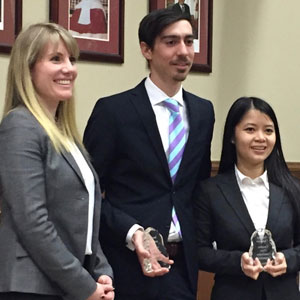 The competition simulates a law office consultation in which two law students, acting as lawyers, are presented with a client matter. This year it was held at Western University Faculty of Law. The winning team moved on to the Louis M. Brown and Forrest S. Mosten International Client Consultation Competition in Windsor in April.
The competition simulates a law office consultation in which two law students, acting as lawyers, are presented with a client matter. This year it was held at Western University Faculty of Law. The winning team moved on to the Louis M. Brown and Forrest S. Mosten International Client Consultation Competition in Windsor in April.First: Lan Nguyen and Alex Ciccone of the University of Victoria
Chaitons LLP Corporate Restructuring Advocacy Competition
This year, the annual Western University in-house moot was held March 2. The problem centred on an appeal from the decision of the Ontario Court of Appeal in Re Nortel Networks Corporation, which addressed the issue of whether the “interest stops rule” applies in CCAA proceedings.Best appellant team: Chenyang Li and Matt Aleksic
Best respondent team: Scott Azzopardi and Matthew Klinger
Clinton J. Ford Moot
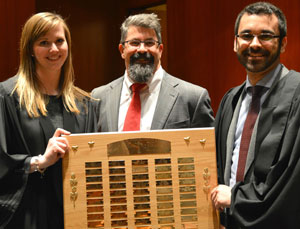 Teams in the in-house appellate moot for the University of Alberta debated the problem of R. v. Saeed, the appeal of which was heard by the Supreme Court of Canada earlier this year. The case is about whether a warrantless penile swab violated the accused’s s. 8 Charter rights.
Teams in the in-house appellate moot for the University of Alberta debated the problem of R. v. Saeed, the appeal of which was heard by the Supreme Court of Canada earlier this year. The case is about whether a warrantless penile swab violated the accused’s s. 8 Charter rights.First: Marianne Dunn and Robert LaValley (representing the respondent Crown)
Davies’ Annual Corporate/Securities Law Moot
This year, the moot was held March 4-5 and the problem dealt with issues that have often arisen in connection with hostile takeover bids. Of the 13 law schools that competed, the University of Toronto and McGill University faced off in the final round.First: The University of Toronto (Simon Cameron, Adam Edgerley, Tyler Henderson, and Dov Kagan)
Second: McGill University (Stephen Albers, McLean Ayearst, Emily Hutchison, and Max Zidel)
Third: University of Alberta (Matthew Dolan, Alexandra Dunn, Ashton Menuz, and Daniel Van den Berg)
Best oralist: Dov Kagan (University of Toronto)
Second: Vanessa Locicero (University of Windsor)
Third: Elizabeth Brachaniec (Dalhousie University)
Best factum: University of Toronto
Second: University of Ottawa
Third: Dalhousie University
Donald G. H. Bowman National Tax Moot
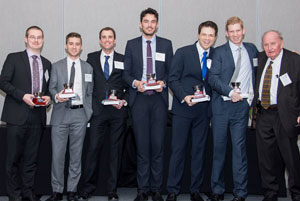 The 2016 moot, named after former chief justice of the Tax Court of Canada Donald G. H. Bowman, took place in Toronto Feb. 26-27. The students argued Guindon v. The Queen.
The 2016 moot, named after former chief justice of the Tax Court of Canada Donald G. H. Bowman, took place in Toronto Feb. 26-27. The students argued Guindon v. The Queen.Best Team: University of Calgary
Best Factum
Appellant: University of Alberta
Respondent: University of British Columbia
Best Advocate: Martin Banach (Osgoode Hall Law School)
ELSA Moot Court Competition
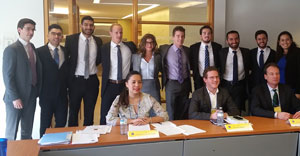 This year, the moot was held at Queen’s University March 2-6. Students from across North and South America come to compete in the area of international trade law.
This year, the moot was held at Queen’s University March 2-6. Students from across North and South America come to compete in the area of international trade law.First: Pontificia Universidad Javeriana
Second: Queen’s University
Best oralist, preliminary: Cristian Torres
Best oralist, semi-finals: Santiago Osorio
Best oralist, final: Santiago Osorio
Best written submission complainant: Universidad del Rosario
Best written submission respondent: Pontificia Universidad Javeriana
Best written submission overall: Pontificia Universidad Javeriana
First-Year Appellate Competition Moot
The annual First Year Advocacy competition took place the week of March 14. The subject of the moot this year was the Supreme Court decision in Fearon, dealing with Charter rights and police searches.First: Jack Brown
Harold G. Fox Intellectual Property Moot
This moot, named after one of Canada’s leading intellectual property scholars and advocates Harold G. Fox, deals with issues concerning IP laws. This year, the problem involved fictional case Ann Phibian v. The Canadian Frog Association. Sponsored by Dimock Stratton LLP, it was held Feb. 19-20.First: Stefan Case and Victoria Hale (University of Toronto)
Second: Alicja Puchta and Keton Motta Freeman (Osgoode Hall Law School)
Semi-Finalists: Sam Keen and Shane Thomas (University of Toronto) and Andrew Martinez and Yasir Samad (University of Ottawa)
Donald F. Sim Award for best oral advocate: Stefan Case (University of Toronto)
Second: Steve Falkingham (University of Manitoba)
Gordon F. Henderson Award for best factum writers
Appellant: Alicja Puchta and Keton Motta Freeman (Osgoode Hall Law School)
Respondent: Stefan Case and Victoria Hale (University of Toronto)
Dimock Stratton LLP award for best mooter in non-graduating year: Stefan Case (University of Toronto)
Hicks Cup
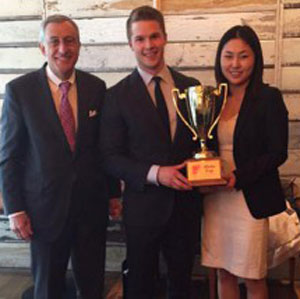 The Hicks Cup requires students to argue constitutional or administrative law issues at an appellate level. The students debated current legal issues from human resource law and administrative law. The aim of the moot is to give all law students the opportunity to develop their oral advocacy skills. This year, it took place April 1 at Hicks Morley’s Toronto offices.
The Hicks Cup requires students to argue constitutional or administrative law issues at an appellate level. The students debated current legal issues from human resource law and administrative law. The aim of the moot is to give all law students the opportunity to develop their oral advocacy skills. This year, it took place April 1 at Hicks Morley’s Toronto offices.First: Jennifer He and Michael Barrett (Western University)
Hockey Arbitration Competition
This moot, which simulates NHL salary arbitration hearings involving real players’ processes, was held Nov. 7 last year. It aims to give students the opportunity to work on their advocacy skills within a specialized context. The final round dealt with the 2015-16 salary of Edmonton Oilers defenseman Justin Schultz.First: Brad Morris and Conor O’Muiri (Queen’s University)
Second: Daniel Green and Wesley Gerrie (Syracuse Law)
Julius Alexander Isaac Diversity Moot
Named after the late chief justice of the Federal Court of Appeal — the first black judge to sit on a federal court in Canada — the moot focuses on issues of equity and diversity. This year, the moot was held in Toronto Feb. 12-13 and the problem focused on a judicial review of the decision of the Law Society of Upper Canada in the fictional case of A.B. v. Law Society of Upper Canada.First: Solange Davis-Ramlochan and Sarah Rostom (University of Toronto)
Best factum: Bethany McKoy and Hannah Shaikh (Osgoode Law School)
Best oralist: Sarah Rostom (University of Toronto)
Kawaskimhon National Aboriginal Law Moot
This year, the annual moot was held March 11-13 at Queen’s University. A total of 17 law schools from across Canada came together in a talking circle format rather than an adversarial process to discuss and negotiate on several issues raised by the Final Report of the Truth and Reconciliation Commission. The moot always focuses on aboriginal issues. There are no rankings in this moot — the goal is for all parties to reach a consensus.Lenczner Slaght/CBA Gale Cup Moot
Osgoode Hall hosted this bilingual mooting competition Feb. 19-20. From around the country, 20 law schools came to argue a constitutional law case. A three-judge panel heard a mock appeal from a real decision of the Supreme Court of Canada R. v. Nur, which addresses whether a three-year mandatory minimum sentence for possession of a restricted firearm is a violation of Charter rights.First: Greg Elder and Vallery Bayly (McGill University)
Second: Jocelyn Plant (University of British Columbia)
Third: Bob Bell and Michelle Psutka (University of Ottawa)
Fourth: Sam Alzaman and Matthew Summers (University of Alberta)
Dickson Medals for Exceptional Oralist
Preliminary round: Jocelyn Plant (University of British Columbia) and Adrienne Oake (Queen’s University)
Final round: Michelle Psutka (University of Ottawa)
Peter Cory Factum Prize
First: Bob Bell and Michelle Psutka (respondent team from University of Ottawa)
Second: Joshua Lerner and John Petrella (appellant team from Western University)
Third: David Suk and Eric Hendry (respondent team from McGill University)
Mathews Dinsdale & Clark National Labour Arbitration Competition
Every January, teams from law schools across Canada compete in a simulation of a grievance arbitration hearing based on emergent issues before tri-partite panels. This year, it was held the weekend of Jan. 30 at the Ontario Labour Relations Board. Each year’s problem comes from emergent and contentious labour law issues. For 2016, law students researched and argued the management and union side of a case centred on whether an employer could switch from a defined benefit pension plan to a defined contribution plan, and whether an employer could discipline two employees for picket line conduct.First: William McLennan and Andrew Mercier (Dalhousie University)
Second: Kaley Duff and Hilary Ingle (University of Toronto)
Ontario Trial Lawyers’ Association Cup
This annual moot is held in a different courthouse every year and presided over by a local judge. This year, it took place March 5 in Windsor, Ont.First: Jennifer Cao and Shayla Stein (Queen’s University)
Best opening: Dayna Cook (Windsor University)
Best examination in chief: Laura Lepine (University of Western Ontario)
Best cross examination: Jennifer Cao (Queen’s University)
Best closing: Juliano Pichini (Windsor University)
Best overall advocate: Shayla Stein (Queen’s University)
Oxford International Intellectual Property Moot
Held annually over three days in March, this year, the 14th moot was held March 17-19 at Pembroke College, Oxford. The problem this year dealt with the “ambush marketing” of the Erewhon Community Games.First: Fred Wu, Laura Macdonald, and Tracey Doyle (University of Ottawa)
Second: Gaurav Bhawnani, Pratiksha Basarkar, and Shridhar Kale (National Law School of India University, Bangalore)
Sir Nicholas Pumfrey Best Individual Mooter
First: Fred Wu (University of Ottawa)
Second: Tracey Doyle (University of Ottawa)
Third: Rebecca Schild (University of Windsor)
Fourth: Krissy DiBenedetto (George Washington University Law School)
Fifth: Kelly Tseng (National University of Singapore)
Walsh Family Law Moot
The moot — named after former justice George Walsh — was held March 12 at Osgoode Hall. It attempts to mirror the high-conflict environment of family law.First: Lesley Campbell, Mackenzie Falk, Rebecca Hines, and Rebecca Locksley (University of Windsor)
Second: Alicia Landry, Umberto Campella, Stephanie Kolla, Justin Amaral, and Paige Donnelly (Osgoode Hall Law School)
Wilson Moot
The 2016 Wilson Moot, which took place in Toronto Feb. 19-20, promotes justice for people disempowered within the legal system. It takes its name from late Supreme Court of Canada justice Bertha Wilson. This year, the fictional problem focused on issues with access to sex reassignment surgery for transgendered people.First: University of Toronto
Second: Osgoode Hall Law School
Third: Queen’s University
Best oralist: Adam Cembrowski (University of Alberta)
Second: Andrew Choat (Queens University)
Third: Jason Harley (University of Alberta)
Best written argument: University of Toronto
Second: University of Ottawa
Third: University of Victoria
Sopinka Cup
Held March 11-12 in Ottawa, the annual national trial advocacy competition for Canadian law schools honours the late justice John Sopinka, an outstanding lawyer, teacher, author, and expert in law of evidence. Participants are involved in a jury trial related to criminal law, with a structure more similar to a trial and calling on students’ courtroom advocating skills. This year, the problem centered on R. v. Julie Suzanne Langis.First: Jonothon Austin and Fraser Genuis (University of Alberta)
Second: Samuel Greene and Malini Vijaykumar (Universtiy of Toronto)
Third: Caroline Humphrey and Marie-Pier Levesque (Université de Moncton)
Regionals
Arnup Cup
This annual qualifying moot is a competition in trial advocacy and set up as a jury trial. The cup is named after justice John D. Arnup, who was one of Canada’s finest litigation counsel for many years before sitting as a distinguished member of the Court of Appeal for Ontario. It is open to Ontario law schools that vie for their spot representing the province in the Sopinka Cup.First: Samuel Greene and Malini Vijaykumar (University of Toronto)
Second: Ira Glasner and Caitlin Sharawy (Osgoode Hall Law School)
Guy-Guérin Cup
With a focus on criminal law, this bilingual moot is held in Quebec and is a qualifying competition for the Sopinka Cup. This year it took place Feb. 12.First: Marie-Louise Chabot and Suzanne Zaccour (McGill University)
Best examination: Marie-Louise Chabot (McGill University)
Western/McIntyre Cup
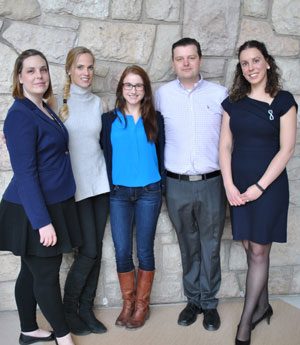 This moot is the regional competition for western law schools to qualify for the Sopinka Cup. It took place Feb. 5-6 this year.
This moot is the regional competition for western law schools to qualify for the Sopinka Cup. It took place Feb. 5-6 this year.First: University of British Columbia
Second: University of Alberta
McKelvey Cup
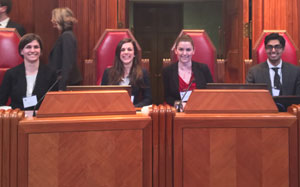 This moot is the Atlantic regional competition of the Sopinka Cup. It took place Feb. 12-13 in Moncton, N.B., and the teams debated a criminal charge of criminal negligence causing death.
This moot is the Atlantic regional competition of the Sopinka Cup. It took place Feb. 12-13 in Moncton, N.B., and the teams debated a criminal charge of criminal negligence causing death.First: Mary Brown and Ria Guidone (Schulich School of Law, Dalhousie University)
Second: Vin Mishra and Kathryn Piche (Schulich)
Best opening: Ria Guidone (Schulich)
Best direct examination: Kathryn Piche (Schulich)
Best cross-examination: Ria Guidone (Schulich)
Best overall advocate: Ria Guidone (Schulich)
White & Case Canadian National Division Qualifying Tournament
This moot is for all Canadian law schools looking to qualify for the Philip C. Jessup International Law Moot Court Competition. Dealing with a number of international legal issues, this year it was held in Ottawa Feb. 27-28.First: Daniel Lasko, Spencer Hoffman, Jon Rocheleau, Andrea Mannell, and Stephanie Ridge (University of Calgary)
Second: University of Western Ontario
Philip C. Jessup International Law Moot Court Competition
The Jessup usually takes its moot problem from a controversial issue of public international law. The 2016 moot’s theme was The Case Concerning the Frost Files. It took place in Washington, D.C. March 27-April 2.First: Universidad de Buenos Aires, Argentina
Second: University of Pennsylvania, United States
Best oralist, final round: Julian Rotenberg (Universidad de Buenos Aires)







